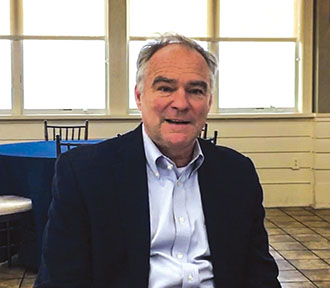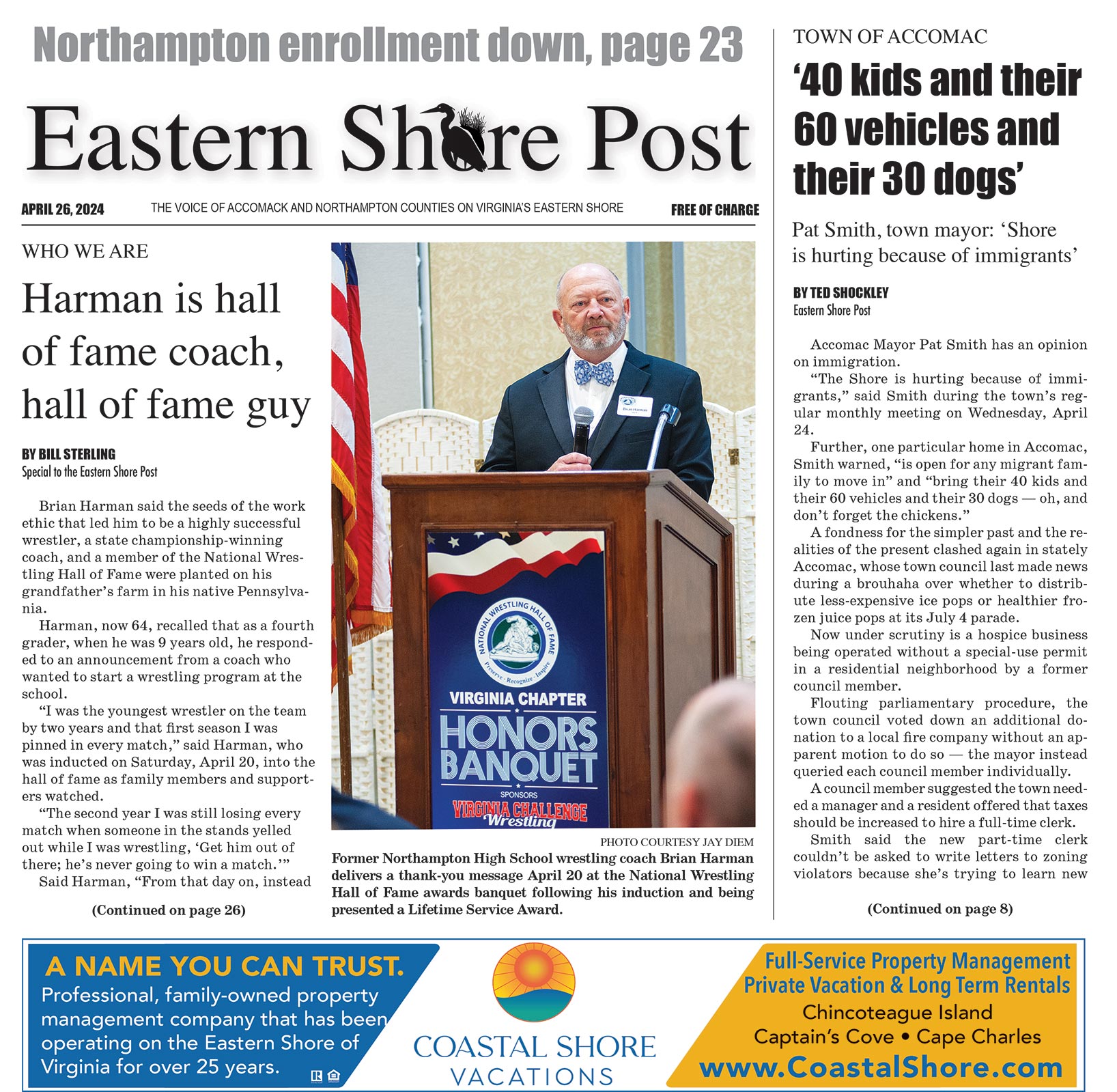By Stefanie Jackson – When U.S. Sen. Tim Kaine visited Cape Charles May 30 for a meeting with Northampton County leaders, the senator appeared to have the most confidence in the ability of Congress to pass an infrastructure bill that would benefit the Eastern Shore.
“It’s the one area where the President and the Democrats have the most in common,” Kaine said. “He’s a builder, the Democrats were willing to vote for an infrastructure bill, so there’s an opportunity there.”
It could cost as much as $2 trillion to fund a massive infrastructure bill, and “I think there’s a bipartisan agreement that a lot of it should be focused on rural communities,” Kaine said.
The bill would include funding for broadband internet, roads, railways, and school renovations, he said.
Northampton County Administrator Charlie Kolakowski told Kaine that it’s difficult for locals to obtain financial assistance from the U.S. Department of Agriculture (USDA) due to its policy of awarding grants to individuals earning no more than 50% of the median income for the area.
Northampton’s median income is so low that hardly anyone makes 50% of that, so it’s almost impossible to qualify for assistance, Kolakowski explained. Yet assistance is available for people who make more money in other counties, he added.
“There ought to be a fix for that,” Kaine said. “That doesn’t make any common sense.”
Kolakowski suggested possibly aligning the income requirements with the federal poverty level.
There was discussion about which industry could do for Northampton what the Wallops Flight Facility did for Accomack. It not only brought jobs, it enhanced tourism, attracting visitors to watch rocket launches.
Kaine asked what kind of businesses the Northampton community wants, pointing out that Northampton is situated between Wallops Island and the Little Creek naval base in Virginia Beach, Va.
Kolakowski would like to see a military equipment refurbishing establishment, as well as more small businesses, which help families break the cycle of generational poverty, he said.
He also wants to continue expanding access to broadband internet for people who want to move to Northampton for the lifestyle and telecommute to work.
Northampton County Farm Bureau President Steve Sturgis said tariffs are hurting farmers, with soybean prices hitting a 15-year low and the cost of doing business skyrocketing.
Farmers are seeking to diversify their crops, and the USDA Specialty Crop Block Grant Program can help (specialty crops include many vegetables, fruits, nuts, herbs, spices, flowers, trees, and shrubs).
But the research grant program requires matching funds on a one-to-one basis that universities like Virginia Tech can’t afford. Sturgis said the grant matching requirement was dropped in 2014 but was later reinstated. He asked Kaine if the grant matching requirement could be dropped again.
Northampton County Director of Social Services Mozella Francis thanked Kaine for the bipartisan effort in Congress to pass the Family First Act, which allows federal funding of mental health and substance abuse treatment for parents and in-home parenting programs to prevent the placement of children in foster care.
But there is a shortage of social workers, and federal funding is needed to help recruit them. “It’s critical, because we do not have enough boots on the ground,” Francis said.
Kaine said there would also be a bipartisan effort to reauthorize the Child Abuse Prevention and Treatment Act that could help get social services the assistance it needs.
Donna Smith, CEO of the Eastern Shore Area Agency on Aging/Community Action Agency, emphasized the importance of Community Service Block Grants that fund programs to help families in poverty and support vulnerable populations like the elderly.
“When they cannot get the services that are needed from social services or any other program here on the Shore, they’re knocking at our doors and asking for help,” she said.
Jane Cabarrus, president of the Northampton County NAACP, voiced concern for the education and well-being of preschool children.
Emphasis is often placed on “school, church, and community,” but “home” should come first, she said.
“The little kids, we’ve got to catch them at this early age … but we’ve also got to catch the parents. We’ve got to see the living conditions, the housing conditions … before they even leave home.”
Northampton schools Superintendent Eddie Lawrence said the division had a universal pre-K program until federal funding decreased, but he is proud that Northampton’s pre-K program serves 80% of the county’s 4-year-olds.
He agreed that “we need the ability to reach out before children come to us and get them more prepared to enter school.”
Kaine acknowledged that Northampton is one of the localities that is “treated the worst” by the composite index, a figure that represents how much a locality can afford to pay for its public education.
According to the composite index, land-rich, cash-poor Northampton can afford to pay more per student than cities like Virginia Beach and Chesapeake, Lawrence said.
But Northampton School Board Chairman William Oakley pointed out that 75% of Northampton students qualify for free and reduced lunch.
Crosby Johnson, of the Northampton County Education Foundation, is concerned that as the charter school movement gains ground, public support and funding for public education will continue to erode.
Northampton County Sheriff David Doughty indicated the sheriff’s department has the same struggle as social services and the school system when it comes to recruiting and hiring qualified professionals for modest salaries.
The starting salary for a deputy is $31,000, and healthcare costs compound the problem. Doughty said one of his employees has to spend one entire paycheck on healthcare every month.
The Rev. Kelvin Jones summed up the dilemma and its impact on the community. “When I’m making … coming out the police academy, $31,000 a year, to get shot at … and one of my checks goes to healthcare, how do I feed my children? … How do I hold my head up high and be proud?” he asked.
Affordable housing is also an issue. Murray added, “Somebody making $31,000 a year is going to have a very hard time finding a place to live in Northampton County.”
Jones believes Northampton needs to attract businesses that will bring jobs and give people marketable skills and a feeling of worth, restoring a sense of community pride that has faded.
Northampton Supervisor John Coker wrapped up the discussion with a suggestion for addressing the county’s infrastructure woes, but warned Kaine that he might not like the idea because “you don’t want to give the President a win.”
“If you’re willing to give $1 trillion away to rich people and to big corporations, why not lend $1 trillion or $2 trillion … for free?” Coker asked.
“You’ve got an asset on the books … you’re not giving anything away. … And maybe discount it to the poorer communities like we are, and the richer communities, you make them pay full price. … You get the money back in 20, 25 years, just like you did to the banks.”
“We need infrastructure bad, up and down the Eastern Shore. … We need some place to get the money. We’re not getting it from Richmond,” Coker said.
Kaine answered, “We’ll give the President a win on infrastructure.”



